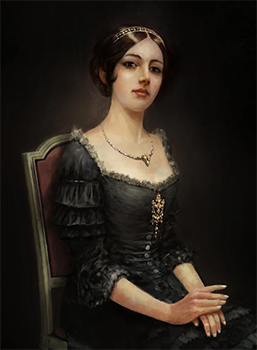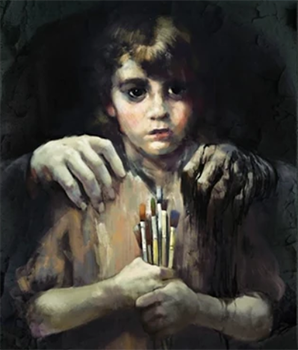I believe in you, as I always have.
ABOUT
Miss Regina Kirkstein is a dark, stern person, but not entirely uninviting to those who feel the need to make the effort. Her style of clothing is demure and subdued, always in dark colors and often in black, and she wears no makeup on the daily and very little when performing. She is very emotionally resilient but part of that is some distance between her and others, though she allows this bridge to be crossed. She moves like a soldier, despite being an artist. Imposing and strong, but it can be a protective stance.
Regina feels like honoring her talent is how she will honor and connect with all four of her parents. But she is not happy her adoptive parents closed her off from who she was, and the supernatural calls to her. Her own paintings can go from lifelike to very macabre but always proper, always touching lines but not crossing them (The ones she shows to others, at least) She wants to master the dark powers sustaining her fame and fortune, without succumbing to the violence her mother suffered or her father enacted on others.
She is bisexual but very closed off, and she will expect monogamy. She does not drink and distrusts those who do.

Backstory
Regina is the adopted only daughter of the Kirkstein family, a well-off couple who has been taking care of her since she was around seven years old, and was formally adopted at eight. By all accounts, she was a well-behaved but very closed-off child, and beautiful too, with perceptive dark brown eyes and auburn curls; and was a certified genius: An extremely talented painter, pianist, and violinist, who from a very young age made was tutored by the very best, as she wanted to live off art, like her birth parents.
She was a very wanted child, as the Kirksteins couldn’t conceive, and her adoptive parents are very proud of her many talents and have nurtured them all. However, they forbade conversations about her birth family, save for some close friends of her father that were still in her life, who contacted Regina by the phone or by letter very briefly once or twice a year. Despite this, her father's tragic fall and dissappearence hurt the Kirksteins as well, who wanted a reunification emotionally even if they felt Regina was safest with them.
Her birth mother was an only child of only children. Of stern character and stark disposition, it seemed unlikely she’d ever marry or find financial security. Her talent in music, however, gave her both: She was a talented and self taught violinist and pianist who went from extremely critiqued to very successful. She was also credited as a muse to her painter husband’s many works, as her music inspired him to the best moments in his career. He, too, had gone up from very little, and had a past as an alcoholic after losing a leg in WW1. He had no family, but a few close friends who became coworkers.
By the time they had their daughter (A miracle baby! Everyone said her mother would never have children!), they’d been married happily for well over a year, and both of them had dealt with their inner turmoil, owned their own mansion, had their own lives that could only get better. And to be fair to them, the first four years of Regina’s life were amazing. But then things started to go awry.
The Musician never forgot her humble roots, and sometimes performed in malls and public spaces for the lower classes. Unfortunately it was at one of these performances where she was horribly scarred: The mall she was playing in caught fire, disfiguring her face and difficulting her movement. She had a hard time even moving her fingers, suffered from spasms she could not control, and became an ambulatory wheelchair user. In a misguided effort to care for her, the Painter discouraged her from practicing music, and contacted medics of all sorts to correct the disfigurement in her face and the burns on her skin, making her feel unlovable, even though he did not care for how she looked like: His goal was restoring mobility. Her few friends deserted her, and she had no solace but teaching her daughter to play music, and her temper became more finicky. Mother and daughter began to fight, though by night they always made up.
The Painter began drinking again, slowly turning to “madness”. He ignored everything but his art, drinking heavily, and ignoring his family, save for when he took his time to teach his child. He was not a good teacher, focusing too much on the negative to even be constructive. He suffered from frequent artist block, and he stopped getting work and the ability to sell, too. He ignored his own daughter for months at a time, even forgetting her own birthday. His wife couldn’t take it anymore, and soon after she burned all the paintings that depicted her as she was before her accident, shut herself in a bathroom, and took her own life. It took her husband hours to notice she was dead. It took Regina ten minutes.
Finding his wife’s corpse, the Painter "awoke", in a sense. A dark, supernatural force took over him, convincing him that if he finished his Magnum Opus (The perfect painting) his life would turn around, and all the pain would leave. Taking body parts from his wife, he tries to paint his wife over and over. He did not sleep, drink, or eat, but it did not matter: The house sustains him. The house provides supplies, and makes the body parts appear again and again. The house replays conversations, and shows him ghosts. It plays tricks on him, too, moving objects from place to place and not letting him leave, making him seem erratic, as only he understood the true nature of the house. Eventually he went missing and, years later, presumed dead.
Years later, Regina, now a young woman, gets the house in his father's will: He has left her the house, and when she enters, she finds herself in his same supernatural predictment. Regina does finish the Magnum Opus, as well as restoring her father's previous failed attempts. She also finds her mother’s unfinished musical pieces, and performs them too. She achieves fame and fortune, and has a small exhibit called Layers: She arranges the restored paintings in a gallery that's less and less lit as you go on, leaving the true Magnum Opus by its end. It is called an optical illusion often, as people have a hard time describing it, and most swear the face in it moves (Those that call it a face, at the very least) and people have fainted and cried at the sight of it. Some have also laughed and danced, humming melodies they don't remember hearing. It’s as eerie as it is beautiful. Sad and haunting. Emotive and dark. With this, Regina tries to master the dark powers her birth parents meddled with before she was born, as well as bring justice to their legacies.
(The key to finishing the Magnum Opus was a macabre one, making the liquified eyes of her mother part of the art itself: A painting must look at you as much as you look at it. By the time she finished it, the eye was liquefied enough that she could easily turn it into an overcoat. Her father's flaw had been his ego. Miss Regina Kirkstein makes no secret that blood, bone, eyes, and hair for the brush were part of the painting, however she says the hair came from a locket her mother left her, and the rest of the body parts from animals. Save for the brush, which people have seen, most people think that bone and blood being part of the painting are at best from a butcher and at worst a publicity stunt.)
